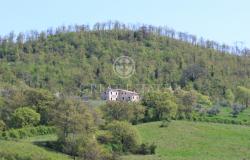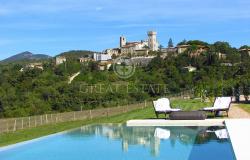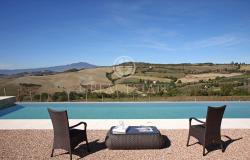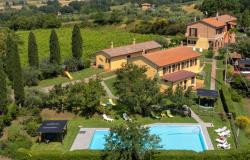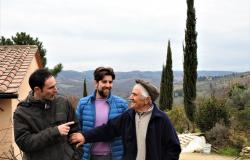Elena Vignali sends this warm article on the London bombings from a Florentine point of view.
Piazza della Signoria, Florence
I would like to share with you a precious gift from the town of Florence to its citizens, one among many in this Florentine Summer, full of events that seem never to end. A calendar rich in concerts, music and dance. Nearly all the squares in the historical centre stage performances of jazz bands, blues groups, classic orchestras. There is certainly plenty of choice to suit every taste.
On the 8th of July, Piazza della Signoria hosted one of the final concerts of the Maggio musicale fiorentino, a musical event which is held every year in Florence during the months of May and June.
In the late evening the piazza is crowded with people, a stage having been erected in front of the 14th century Loggia dei Lanzi, a covered space like an open air art gallery with copies of Greek and Roman statues and Renaissance work of arts of authors such as Cellini and Gianbologna.
There is an incredible variety of people in the crowd: different ages and races, students, middle aged couples, older people bringing their own chairs to sit on, groups of youngsters sitting on the ground, parents with children in pushchairs or perched on their shoulders. I can hear people around me speaking not only in Italian and American-English but also in Spanish, Japanese and Russian.
The welcoming speech is given by the Mayor of Florence, Signor Domenici. It is short and not at all rhetorical, he tells us that this concert is to be one of the the last ones on the calendar. Then the topic suddenly changes to the London bombings, the casualties, the dead and their families, affecting the entire City of London. Next to speak is the British Consul in Florence. She has sad words to say: the emphasis is on the dignity shown by Londoners in the aftermath of the bombings and she concludes by saying that listening to a classical music concert is a wonderful way of remembering and commemorating this atrocious event.
We all clap warmly. The crowd cheered the Mayor, a much loved and very popular figure in Florence. The words pronounced in such good Italian by the British consul were receive in respectful silence. After all, not only is she the representative of a country which has been the most recent target of international terrorist attacks but also of a country that plays a big role in the local tourist industry.
Even the foreigners clap too. They must surely have understood the words Londra (London) and bombe (bombs) and sensed the huge support of the Italians for the sentiments expressed.
The silent statues in the Loggia also seem to agree, and the David replica from time to time appears to project some interested looks onto the square and its temporary guests.
My thoughts seem to follow the rhythm of the music: the cadences bringing to mind the recent images seen on TV or newspapers. Images of those smoke-blackened Londoners escaping from subway stations; images of the gutted bus, of the trains blown to smithereens.
These memories bring to my mind other thoughts from the past, especially remembering the survivors of the Twin Towers and the Madrid Atocha train station.
And this world drama has an even more familiar flavour when I think of my friend Rachel, a Londoner who now lives in Florence and yesterday was not able to contact her father in London, or when I think of my mother’s neighbour who this morning rang her bell to ask if I was still alive. She did not know that I had recently moved back to Italy form the UK. I think of the London I know so well, of the many weekends spent there with friends, of the small suburban town in Surrey just outside London where my partner worked. I thought of his office colleagues and his relatives who use the tube daily to go to work
In the meantime the music continues. Ammanti’s statue of Neptune, which dominates the square from the centre of the grand fountain where he stands with raised hand, seem to be competing with the conductor in directing the orchestra.
Behind the Loggia stands out Benvenuto Cellini’s statue of Perseus. In his hand he holds the decapitated head of the Medusas, an allegory of the terrible consequences of hatred and wars. I gaze around me: the palaces dominating the square seem to be so solid and permanent. They survived civil wars, insurrections and even religious rebellions. In the middle of this very square, not very far from where I am standing, the monk Savonarola was burnt alive in the 15th century after trying to create a Republic based on religion. And the thought of Savonarola takes me to another Italian town, Ferrara, where the monk himself was born and where I was born too, and to yet another piazza where in 1943 my mother’s parents died under one of the first Anglo-American bombings on Italian territory. And I reflect on how history repeats itself: how often those who bombed yesterday are those who now today are the victims. I think about my mother’s life growing up as an orphan, and think sadly of other children whose lives will change as a result of these latest bombings.
My thoughts are interrupted by the arrival of two persons of Arabic appearance, the features and their skin colour revealing their Egyptian nationality. They take their places in front of me; meanwhile some people around us stare at them with evident suspicion. Instinctively I find myself feeling rather uneasy about their proximity. They must sense it because one of them smiles at me, and in that smile I recognised the open smile of a dear Egyptian friend of mine. What have I done? I too have fallen into the racism trap, which so often simply starts out as a fear of something foreign and unknown. Some hours earlier I had been shocked by the news, reported on Italian TV, that Muslim leaders had advised their communities in London not to go out on the streets…I wonder why…
The evening unfolds, and the concert ends with Schiller’s Hymn to Joy. The choir sings out strongly and the music permeates the whole piazza. It seems to penetrate even the walls of the Palaces right up to the tower of the Old Palace. Church bells ring out from afar and this reminds me that we are living in a multi racial and multi religious society. The hymn embraces everything and every person. I notice a group of young teenage boys. They listened very quietly and thoughtfully to the music, and one of them seems to be moved. Perhaps, I think, they are musicians themselves. I feel very proud to be Italian. I have before me some of the most precious works of art in the world. My ears are filled with wonderful melodies, and just like me, these youngsters have appreciated some of the highest expressions of Italian art. If I leave aside the uncountable economical problems that this country suffers from at present and the eternal political arguments, I do consider myself blessed to live in such a country that offers so much to its younger generation in terms of art and leisure.
And a further thought springs to mind: Italy is thought to be the next victim of international terrorism and this may mean that young boys such as these in the square could be its future victims, or, why not, I too could be a victim, as I am probably moving to Rome soon and will be forced to use the subway. A memory of a TV war scene of children and young people killed or injured in Iraq troubles me. Without thinking of all the implications of the Iraqi war I know there must have been young people there whose lives have been taken away while listening to a familiar piece of music playing in the background, or whose lives have been interrupted not by a bomb, cowardly hidden under the seats of a train or bus, but by a bullet that someone aimed at one of the many police check-points on Iraqi territory
The reaction of ordinary people today in Italy is to ask why the terrorists have once again targeted ordinary citizens. Even more, come to that, why is it that after the last tragedy in Madrid so little effort has been made to improve the situation in the Middle East and to appease the hatred that those populations feel towards the West?
And a very last thought comes spontaneously; what can we do to stop a possible carnage taking place on the Rome subway, in Milan’s international airport or, why not, in a square packed with people during a concert in Florence? I do not have the answer but, like many of us, I know that something has to be done before the next fanatic thinks of spoiling the dreams and the futures of more young people who cannot be stopped from taking a bus to work, booking an airplane to go on holiday, or just spending an evening listening to a concert in a square somewhere in the world.

